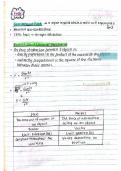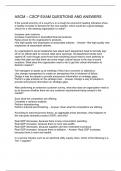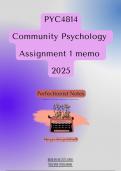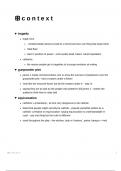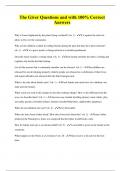,Lecture 1
Human Development: multidisciplinary scientific study of how people change and how they stay the
same; 6 main parts, Socio emotional, intellectual, moral, psychological, physical, spiritual
The goals of developmental psych
1. Understanding
2. Explanation - how we learn and process information
3. Application - how we apply the information
Exemple: neurodivergent, 1. Understanding
Recurring issues
Nature vs nurture
Nature Nurture
Innate Environmental
Biological Experiential (experience and observation)
Genetic
Continuity and discontinuity
Discontinuous Development: qualitative change
Halted--shifts
Universal vs context specific development
Universal development: same for everyone
Context specific development: different depending on classes or countries
Organismic vs mechanistic factors
Organismic Mechanistic
- The child is active - The child is passive
- The environment is passive - The environment is active
- nature - Nurture
Basic forces in human development:
The biological forces
- everything genetic and health related factors affecting development
- Provide the necessary raw material (DNA)
- Set the boundary conditions for development
Psychological forces
- All internal perceptual cognitive, emotional and personality factors affecting development
Sociocultural forces
- All interpersonal, societal, cultural, and ethnic factors influencing development
- Clark doll test:
- 53% bad doll
- 33% most resembled white doll
Life-cycle forces
- The differences in how the same event can affect people of different ages -> experiencing
something together
- 9/11
- Covid 19 pandemic
- The timing of an event influences its significance
- Memory
, - Affect your life? (had a job during covid, went to online school)
- Coping strategies
Timing - Need to consider 3 elements of timing
- Critical periods -> when a child is born they need to hear language and develop parts of the
brain in a happy and healthy environment
- Optimal Period -> best time to learn a new language is when our brain is still developing very
young child
- Readiness -> need to go to kindergarten because their brains are ready for the challenges
Developmental Theories
Why Study Theories of Development?
- Theory: organized set of ideas that explains development
- Some explain specific aspects of development
- Advantages of Theories:
- Create detachment -> step away from what happening and understand
behind it
- Allow evaluation of one’s own views
- Give shape to data
- Theories also:
- Reflect different theorists (Different historical periods)
- Affect questions asked
Five theoretical perspective relevant to Childhood Development
1. Learning Perspective
2. Cognitive-Developmental Theories
3. The Psychoanalytic Tradition
4. Ethology
5. Ecological Systems Theory
Learning Perspective (Influenced by John Locke)
- Human are born a blank slate (tabula rasa: nothing innate, no innate driven
throughout everything learned through experiences → you respond thought
environment)
Major idea:
- People respond to their environments
- Environment causes development
Exemples:
Classical conditioning -> pavlov (money see, monkey doo)
Behavioral analysis -> B.F Skinner (reward + punishment, reinforcement)
Social learning theory -> albert bandura (learning through observation)
Cognitive - development perspective
Cognitive theorists see human beings as:
- Rational (learn to think critically)
- Active
- Alert
- Competent (thought process)
Don’t simply receive information -> We process it
Don’t simply respond to stimuli -> Also give it structure
Theories:
Piaget’s theory (1 of 3)
- How much children know not so important
, - The more important information:
- The way children know
- Piaget studied children’s errors
When encounter new information
- 2 processes possible
- Assimilation: adopting the dominant culture, losing the original culture
- Accommodation: adjusting to new culture while keeping the original one
Stages of cognitive development
Sensorimotor (birth to 2 years) -> All information comes from senses
Preoperational (2 to 7 years) -> Forming concepts using symbols and language
- However, quality of thought still limited
- Magical notions of cause and effect
Concrete operational (7 to 11 years) -> Think logically, several dimensions, Must have concrete objects or
events (here & now)
Formal Operational (12 +) -> Reason logically, Use both concrete and abstract thinking, all possibilities
Information processing (2 of 3)
Primary idea: Human functioning similar to Computer functioning
- Cognition is computer-like system with 3 parts
- Input from senses (comes in from outside)
- Internal processes (internal computer)
- Output
Information processing theorists believe that development is continuous
- Developing child has a better memory, more effective strategies…
- Same child just better and more mature
Social cognition (3 of 3)
Most important elements of development include:
- Knowledge of the social world
- Interpersonal relationships (core groups)
Primary Theorist: Lev Vygotsky’ sociocultural model
- Culture is important to cognitive development (not only on perspective but on thought
processes and how you utilize information)
- Learning should be matched with development level (school level should be at the optimal
timing of learning, doing work for right level of challenges)
Psychodynamic theory (freud)
Behavior is governed by motives and drives
- Internal
- Often unconscious
Psychoanalytic levels of consciousness
Psychosocial Theory (Erik Erikson)
- Heavily influenced by Anna Freud
Throughout development, conflicts occur
- Affected by social context
- Stages of development are influenced by a number of crises
Stage 1 (birth to 1 year) = trust vs mistrust
Stage 2 (1-3 years) = autonomy vs doubt
Stage 3 (3-6 years) = initiative vs guilt
Stage 4 (6 to 13 years) = industry vs inferiority

